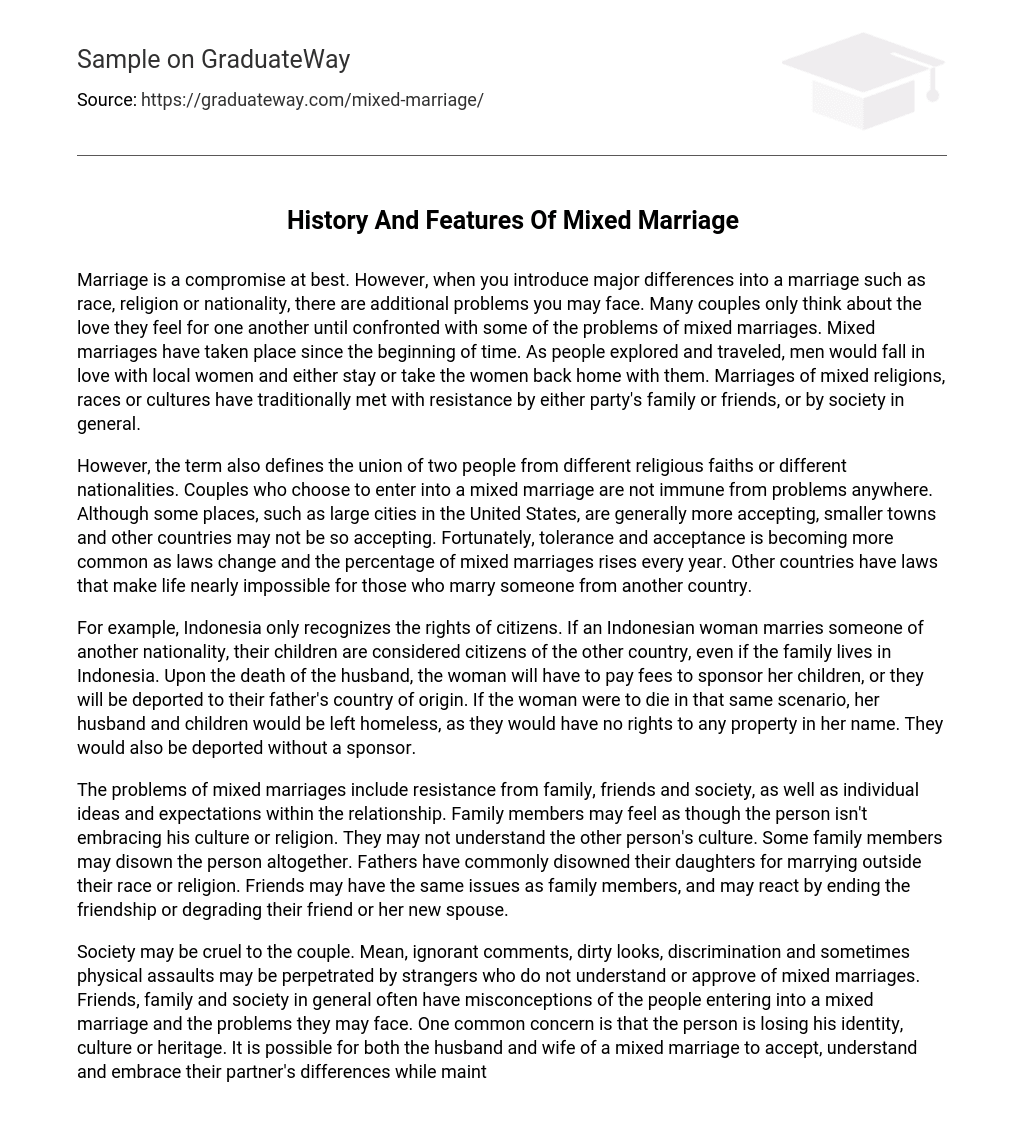Marriage necessitates compromise, particularly when it encompasses notable differences such as race, religion, or nationality. These disparities can present extra hurdles within the marital bond. Despite many couples putting their love for one another first, they may encounter unique difficulties in mixed marriages. Throughout time, mixed marriages have arisen due to people’s exploration and journeys. Men would establish romantic relationships with women from various regions and either choose to remain there or bring them back to their own countries. Marriages that involve diverse religions, races, or cultures often face resistance from families, friends, and society at large.
The term “mixed marriage” refers to unions between individuals of different religions or nationalities, which can present challenges regardless of geographical location. Although larger cities in the US tend to be more accepting, smaller towns and some countries may not provide the same level of accommodation. Thankfully, tolerance and acceptance are gradually on the rise due to evolving laws and an increasing number of mixed marriages. However, certain nations have legislation that creates obstacles for those who marry individuals from different countries.
Indonesia acknowledges the rights solely for its citizens. In the case of an Indonesian woman marrying a foreigner, their children will be regarded as citizens of the foreign country, even if residing in Indonesia. Should the husband pass away, it becomes the responsibility of the woman to cover her children’s expenses; otherwise, they will be repatriated to their father’s home country. Similarly, if the woman passes away, her spouse and children will forfeit any entitlement to her assets and face deportation without assistance.
Mixed marriages pose various challenges, including encountering opposition from family, society, and friends, as well as facing differing perspectives and expectations within the relationship. In terms of family dynamics, there may be a perception that one individual is not fully embracing their own cultural or religious heritage, resulting in a lack of comprehension for their partner’s background. In extreme cases, loved ones may even disown their family member. It is not uncommon for fathers to cut ties with their daughters when they marry someone from a different race or religion. Friends can also confront similar issues as family members and might react by terminating the friendship or belittling either the friend or their new spouse.
Mixed couples frequently encounter adverse reactions from society, such as derogatory remarks, disdainful glares, bias, and even physical attacks. These acts of hostility stem from strangers’ ignorance or disagreement with their marriage. Misunderstandings about the obstacles faced by individuals in mixed marriages are widespread among friends, family members, and society at large. One common worry is that one party may forfeit their identity, culture, or heritage in such unions. Nevertheless, it is entirely possible for both partners to acknowledge, comprehend and welcome each other’s disparities while still maintaining their own unique identities.
Partners in mixed marriages encounter distinct obstacles from family, friends, and society, necessitating a stronger sense of self-assurance and resilience in both themselves and their relationship. A common challenge arises when deciding on the religious upbringing of their children if the couple holds differing beliefs. To circumvent this issue, it is advised for couples to engage in comprehensive discussions prior to making the decision to have a child.
Open and detailed discussions, as well as compromises, can effectively resolve any possible issues that may arise after the child’s birth. Despite potential changes, many couples choose to educate their children about both faiths and allow them to make their own decisions once they become adults. It is important for children born to interracial or multinational couples to learn and appreciate their parents’ cultures and heritages. Forcing them to solely identify with one part of their background would negatively impact their future well-being. Society has historically opposed mixed marriages by asserting that the children would face difficulties due to their parents’ choices.
Even though some well-known figures like Tiger Woods, Halle Berry, and Barack Obama have emerged from interracial or international relationships, it is crucial to engage in open communication and comprehend each other’s decisions and behaviors for conflict resolution. Occasionally, families desire insight into the future to anticipate the progression of a relationship. Neglecting these discussions could unintentionally heighten their expectations.
Having a conversation about the agreements in your marriage with family members, regardless of their agreement, cannot be controlled. However, informing them of the truth is something they can eventually respect. If your interracial marriage is facing difficulties, don’t assume these problems solely stem from racial differences. Below are coping strategies to address issues that may be impacting your interracial marriage:
- Follow your personal beliefs and feelings.
- Don’t let others’ opinions about your marriage worry you.
- Show mutual respect for each other and both cultures involved.
- If differences are causing problems, brainstorm together for solutions.
- Maintain a realistic view of both your differences and commonalities.
- Do not ignore differences, hoping they will disappear by not addressing them.
- Make an effort to bring your families together.
- Stand united and establish boundaries if parents try to interfere in your marriage.
- Help your children understand and take pride in their mixed racial identity.
In the present global climate, there is a mix of increased tension and greater openness, impacting views on interracial marriages. People are now more likely to participate in activities that involve crossing racial and ethnic boundaries. However, there is still existing prejudice and fear towards racial and ethnic groups whom many have minimal contact with. Nonetheless, when individuals make an effort to comprehend the unique traditions, values, and beliefs inherent in the diverse groups that constitute our global societies, they will be better equipped and more willing to collaborate for the benefit of everyone.





